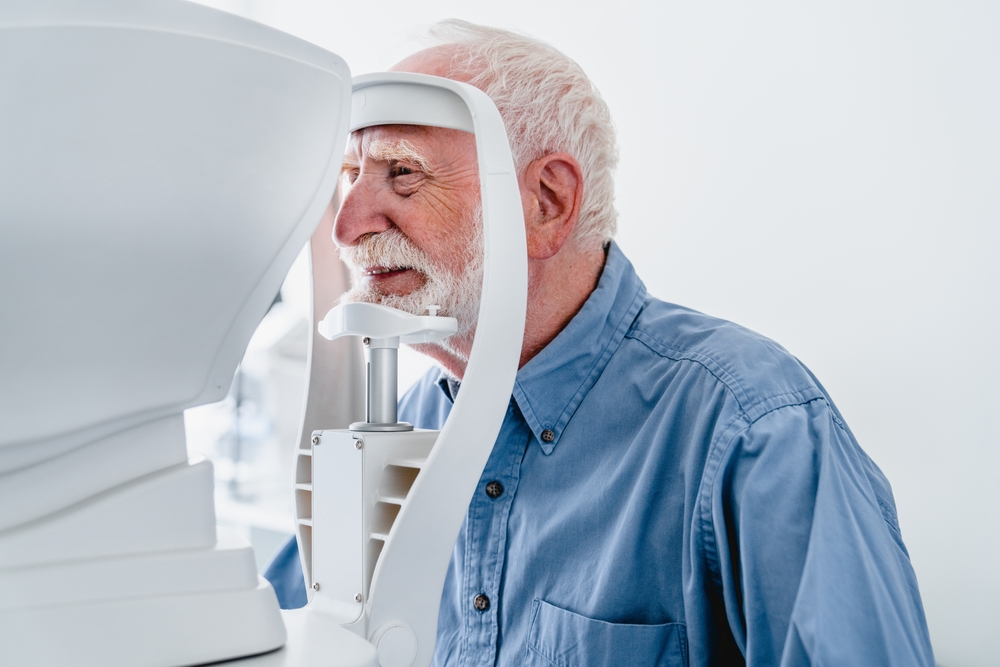How Can I Slow the Progression of Cataracts?
January 16, 2024
Cataracts are one of the most common eye conditions, particularly among older adults. They cause vision issues that get progressively worse over time. 
Cataracts can interfere with daily activities such as driving, reading, watching TV, or socializing with friends and loved ones. The only real cure for cataracts is surgery, which is safe and effective.
Caring for your eyes and avoiding things that may make cataracts worse might be able to delay the need for cataract surgery. Keep reading to learn if you can slow the progression of cataracts!
What Are Cataracts?
Cataracts occur when the lens becomes cloudy and hardened. The lens is a clear structure inside of your eye.
Light passes through the lens to the retina, which then translates the images you see. When the lens becomes cloudy, it can affect vision.
Images may appear blurry, colors may seem yellowed or less vivid, and you may have difficulty reading small print or seeing in dim lighting. You may have cataracts in one or both eyes.
Cataracts can start small and may not interfere with your vision right away. Over time, cataracts will spread across the entire surface of the lens, which leads to increasing difficulty with vision.
Symptoms of cataracts may include:
- Cloudy or blurry vision
- Colors look faded
- Reduced night vision
- Lamps, sunlight, or headlights seem too bright
- Seeing a halo around lights
- Double vision
- Frequent changes of prescription for glasses or contact lenses
If you have any of the symptoms of cataracts, it’s important to visit your eye doctor at Carroll Vision Center. They can examine your eyes and rule out conditions other than cataracts.
If you have a condition such as glaucoma or macular degeneration, you should get prompt treatment in order to prevent vision loss.
Do you think you may be experiencing symptoms of cataracts?
What Are the Risk Factors for Developing Cataracts?
Most cataracts develop as an effect of aging. They can also occur after trauma to the eye, and some cataracts are congenital.
Typically, they appear in people over the age of sixty. Since cataracts typically develop due to aging, everyone will develop them eventually.
There are certain other factors that can increase your risk of developing cataracts earlier in life, including:
- Diabetes
- Excessive UV exposure
- Smoking
- Obesity
- Excessive alcohol use
- A history of eye injury or inflammation
- Previous eye surgery
- Prolonged use of corticosteroid medicines
- A family history of cataracts
You can reduce your chances of developing cataracts early or delay their onset by avoiding activities that increase risk. Quitting smoking, reducing alcohol use, and shielding your eyes from sun exposure will protect your eyes as well as your overall health.
If you have diabetes or take medication that may increase cataract risk, talk to your eye doctor. They can explain what impact that could have on your eye health and how to care for your eyes.
H ow Fast Do Cataracts Develop?
ow Fast Do Cataracts Develop?
Cataracts tend to develop slowly. It can take years before they cause significant vision issues.
During the early stages of cataracts, you may not notice symptoms at all, or they may be very mild. When cataracts are small, or their effects are mild, you may be able to manage the symptoms with appropriate glasses or contacts.
Adjusting lighting or using magnifying lenses may also help with vision changes from early-stage cataracts.
Do you want to learn if you might have cataracts?
Schedule a Cataract Evaluation
Can You Slow Down Cataracts?
There isn’t much you can do to slow down the development of cataracts once they have started. You can protect the overall health of your eyes with lifestyle choices.
Diet and exercise can help manage conditions like diabetes and high blood pressure, which can affect eye health. You can also use UV-protective sunglasses to prevent sun damage.
Keeping eyes moisturized with artificial tears can also be helpful, particularly if you are prone to dry eyes or live in a dry climate.
Are Cataracts Permanent?
Cataracts are permanent. Once cataracts develop, they can only be removed with surgery.
You can delay surgery until the symptoms of cataracts begin interfering with your everyday life, but they will not go away on their own. There are no medications that will slow or reverse cataracts.
What Happens During Cataract Surgery?
Cataract surgery is a safe, effective procedure to remove the clouded lens and replace it with a clear, artificial lens. Your eye doctor can perform the procedure in the office, and you do not need general anesthesia.
The procedure usually takes less than an hour. After cataract surgery, you may need to wear an eye shield to protect your eye.
You will also need to use special drops that your eye doctor will prescribe. You may need to restrict some activities for a few days while you recover.
Most people notice improvement in their vision within a few days of surgery. Vision tends to become clearer, and colors seem brighter without the cloudy lens. You may still need glasses after cataract surgery, at least for some activities.
Do you think you may be experiencing cataracts? Schedule a cataract evaluation at Carroll Vision Center in Westminster, MD, today!



